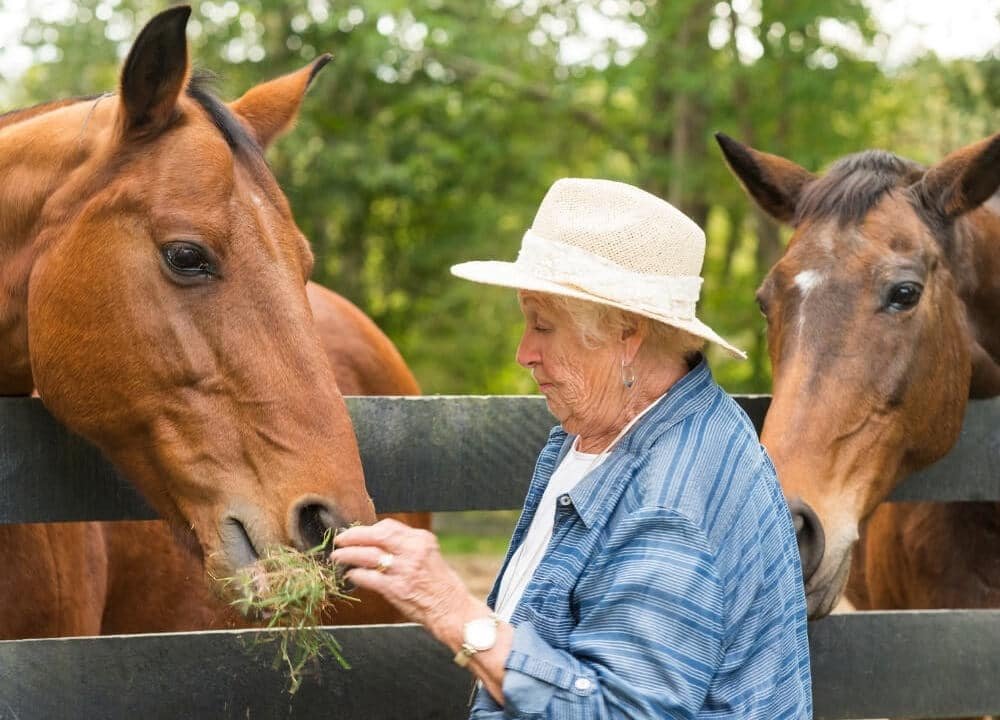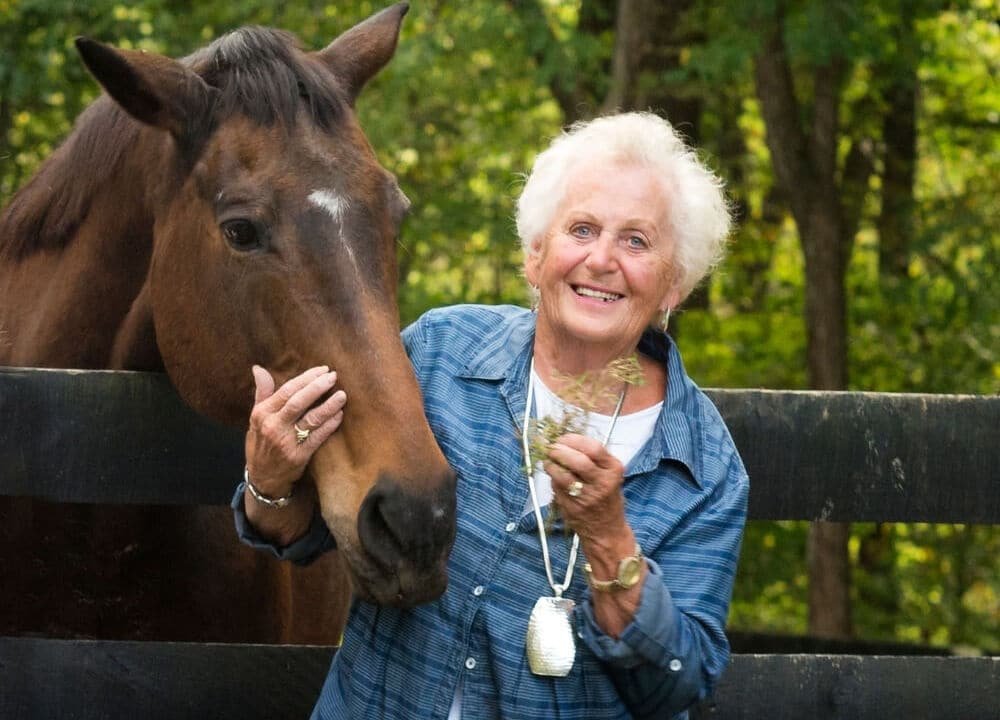It was a really pleasing experiencing witnessing horse therapy for dementia on several occasions.
Researchers are looking into whether this alternative therapy offers a healing hand to individuals with dementia for some time.
Sadly, to date, there is still no approved cure for dementia.
While looking for ways to treat or prevent dementia, professionals work with various methods to improve the quality of life for individuals with the illness.
One of the therapies that are gaining momentum for helping persons with dementia is horse therapy.
What is horse therapy? What does it involve? Does the therapy offer healing?
Read on to uncover answers to these questions and more.
Benefits of Horse Therapy for Dementia

Persons with dementia can get various benefits from horse therapy and some of them may include:
Stress Relief and Relaxation
Many people with dementia find it challenging to relax and let go of daily stressors. Taking care of or riding a horse requires concentration.
When a person is concentrating on the activity at hand, they will probably not be thinking of other factors that may be causing anxiety and stress.
Participants may NOT EVEN realize that they are letting go of their worries. When the session is over, a person may feel better and enjoy more clarity.
Improved Physical Health
When an individual participates in horseback riding, they will use muscles that they may not use in other contexts strengthening the muscles.
The activity also helps to build skills like balance, strength, and dexterity all of which are crucial for riding a horse. It can also be helpful for spine strength and mobility.
Horse riding is also rewarding when it comes to burning calories. Being an outdoor activity, the therapy offers fresh air and sunshine which are great for physical strength.
As a person starts to experience the physical benefits, it can also help them start to feel better emotionally and mentally.
Boosts Independence
While professionals in horse care often accompany participants undergoing horse therapy for dementia, this activity can help boost a person’s independence and self-esteem.
A single person can groom, feed, and ride a horse when they are comfortable with the task.
This gives individuals time alone with the horse and their thoughts perfect for persons looking for a quiet activity.
Completing tasks related to horse therapy also gives people a feeling of self-sufficiency and independence. Interacting with the horses also helps a person to feel needed.
Caring for a living being is a good way of making a person feel like they are CONTRIBUTING something worthwhile to the world.
Learning Something New
While it may be strange for a person with dementia to learn a new skill, it is important to take any chance that may help create connections in the brain.
People DO NOT NEED to have any experience on a farm or with horses to benefit from the therapy.
The hands-on learning exercises horse therapy offer helps to stimulate the brain more than watching a game show or working on a crossword puzzle.
What Makes Horses Ideal Candidates for this Dementia Therapy

Paula Hertel co-founder of Connected Horse a human and animal interaction program explains that something special happens when people visit a horse barn.
They become more aware of the new smells, sounds, and horses as the animals welcome them to their space.
Horses have certain characteristics that make them IDEAL for this type of therapy and some of them include:
Unbiased and Non-judgmental
Horses will only react to a person’s emotions and behavior.
The animals are not biased by the individual’s past mistakes, abilities, or physical appearance, amongst others.
Horses will also NOT complain when a person asks the same question over and over.
This is an aspect that is critical to therapy because it helps increase self-confidence and self-esteem.
Mirroring and Feedback
Horses are keen observers thanks to their nature as herd or prey animals which makes them sensitive and hyper-vigilant.
It implies that their feedback is offered more consistently and earlier than when it comes from human therapists.
Horses also have an innate tendency to MIRROR a person’s physical movements, behavior, and emotions which helps participants become more aware of themselves.
An equine specialist can translate this type of feedback and the group can also analyze it.
Healing Power of Horses for Persons with Dementia (Studies)

There are a few studies that have been conducted on the perks of horse therapy for dementia and the most notable ones include:
Connected Horse and Stanford University
A pilot study was conducted by Connected Horse and Stanford University. This sought to help persons learn how to manage early-stage dementia through a series of workshops.
The professionals recruited persons living with mild cognitive impairment or dementia and their caregivers.
The participants joined a workshop that included activities like leading and grooming horses, awareness practices, and discussion groups.
Researchers carried out standardized tests before and after the workshops in a bid to measure the effects of the workshop on participants’ quality of sleep, stress levels, and ability to communicate and relate to others.
Initial results of the study revealed that participants scored HIGHER for better sleep quality, social support, and decreased depression and anxiety.
The results of the study will be used to come up with more resources to develop training materials, secure more equisetin sites, and get funding for developing new programs.
Ohio State University
Multiple departments at the Ohio State University collaborated to conduct a study on the therapeutic effects of spending time with horses on adults who have Alzheimer’s dementia.
The University collaborated with an adult daycare center and an equine therapy center.
They found that persons with Alzheimer’s the most common cause of dementia were able to feed, groom, and walk horses safely under supervision.
The researchers reported that spending time with horses helps to ease symptoms of Alzheimer’s dementia without using drugs.
The experts also stated that the experience enhanced mood made participants more open to caring, and led to fewer instances of negative behavior.
Church Residences Centre for Senior Health
At the daycare center, A national Church Residences Centre for Senior Health in Columbus recruited 16 residents who had Alzheimer’s (7 men and 9 women).
Eight of the clients once a week took a bus trip to a farm where they visited with horses under the supervision of their caretakers.
The residents bathed and groomed the horses, fed them grass and walked them.
The researchers reported that the persons with dementia enjoyed their time on the farm because they talked to the horses, laughed, and smiled more.
Horses work great to make a dementia patient happy.
This was seen even in the persons who usually acted withdrawn as they became fully engaged in the exercise. The therapy also BOOSTED physical activity.
Even though the clients had physical limitations, they were inspired to push boundaries once presented with the horses. The clients grew more physically active after visiting the farm.
The small study is from the journal Anthrozoos.
Horse Therapy for Dementia Closing Thoughts
While more research is still necessary regarding horse therapy for dementia, current results are promising.
This makes the therapy something worth looking into for people living with dementia and their caregivers.
Bonus: What is Horse Therapy?

Horse therapy also known as Equine therapy or Equine-assisted therapy is a treatment option that includes an equine environment and/or equine activities to promote physical, emotional, and occupational growth in people suffering from various medical issues.
These medical problems include a host of mental health issues. Like anxiety, ADD, autism, dementia, cerebral palsy, depression, traumatic brain injuries, genetic syndromes, behavioral issues.
Equine-assisted therapy is IN USE in mental and medical health fields by major countries.
This type of therapy can help individuals build communication, self-efficiency, confidence, trust, social skills, impulse control, perspective, and learn boundaries, etc.
The Anxiety Treatment Centre reckons that it is easy for ill persons to create a connection with horses because the domestic animals have similar behaviors with humans like responsive and social behaviors.
Horses can also mirror the feelings of a rider or handler. The large and intimidating appearance of a horse forces people to gain trust around them.
Horse Therapy Activities

There are different activities involved in horse therapy for dementia that offer therapeutic benefits and they include:
- Horse riding
- Stroking
- Feeding the horse
- Haltering and leading
- Grooming
In some sessions, depending on the participants’ abilities and mood, a person may not even touch the horse.
Professional therapists often lead the sessions and set goals for their clients.
This can be something SIMPLE like putting a halter on the horse or leading the horse to a designated area.
The client will do their best to complete the task. And then discuss the ideas, thought-process, and problem-solving that were used to finish the task.
The discussions help IMPROVE language skills. Listening to the therapist helps enhance a person’s ability to listen and follow directions.

